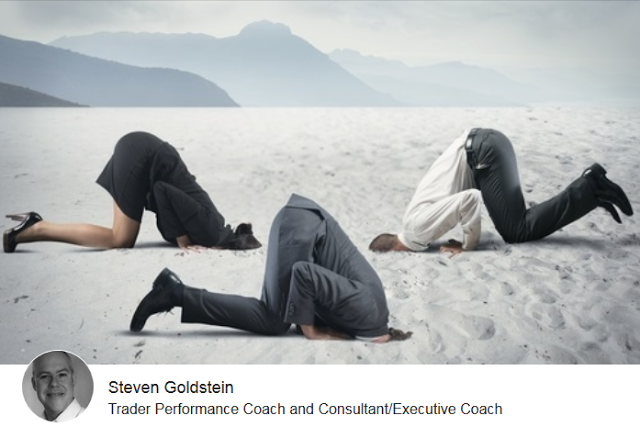The Being of Trading
14th January 2016
The Being of Trading by Steven Goldstein of AlphaRCubed
Dennis Gartman’s timeless trading rule Number 3 states that ‘Capital comes in two varieties, mental and that which is in your pocket. And that of the two ‘mental’ is the most important and most expensive’. Mental capital is so difficult to control and manage because our brains and minds do not work in the way we like to think they do. In a perfect scenario, they would work to make rational and sound decisions, where pros and cons are perfectly weighed up, and outcomes considered and actions taken. However, the reality is very different: Our minds and actions, are swayed, cajoled and derailed by different internal and external push and pull effects. These effects heavily influence the way we think, decide and act. Factors which distort our thinking includes biases, emotions, ego, mental blind-spots, human biological limitations, our relationships with other people, and how we act and conform in social situations. The field of behavioural finance has emerged over recent years as a way of studying these many different factors. It looks to provide greater understanding of how they impact our decision making, how this affects our actions, and how this impacts they way markets behave.
One of the major areas of interest for Behavioural Finance is human biases; distortions in our thinking which cause us to act in less than rational ways. One of the most impactful of biases on our behaviour is ‘Cognitive Dissonance’, this is a term which is best summed up as how we cope when faced with ‘Inconvenient truths’. . When this happens we find ourselves compromised; sharing two differing or opposing beliefs which makes us feel extremely uncomfortable. This becomes more challenging the more we have emotionally staked on it. In these situations we may perform far-reaching rationalizations in order to avoid the discomfort connected to ‘Cognitive Dissonance’. Typically we come down on the side of our initial or invested belief, only changing sides, if at all, when there is overwhelming evidence against us.
People will go to great lengths to convince themselves that a decision they made was the right decision:
In trading and investment, people live and die by the decisions they make. However ‘Cognitive Dissonance’ can go a long way towards seriously damage one’s ability to make sound and rational decisions. Traders and investment professionals whose perceptions are skewed, will not read the markets objectively, and will not act or react rationally to new data. They are likely to be highly selective in terms of their analysis of markets, and will make sub-par choices lacking a solid foundation.
A simplified example of cognitive dissonance from my own experience.
A few years ago when charges were brought against Lance Armstrong by the US anti-doping agency, I found it difficult to accept. Armstrong had long been one of my heroes, having fought and overcome a prolonged battle with cancer to achieve incredible success in the world of cycling. I had invested a lot of time and energy in being a huge Armstrong fan, I read his books, watched anything on the TV about him, and sang his praises to all and sundry. Thus when this new evidence was presented about his cheating, I found myself extremely challenged, I was suffering from two opposing beliefs in my mind.
Belief 1) Lance Armstrong is one of my all-time great sporting heroes and a living legend.
Belief 2) I despise anyone who cheats to get ahead.
These two opposing beliefs occurred together in my mind, either Armstrong was a hero of mine, or a cheat. At first, I found myself defending Armstrong: ’They must be wrong’, ‘They have always had an agenda against him’, ‘What was he supposed to do, everybody else was doing it.’. What was occurring what that I suffered a ‘Cognitive Dissonance’, as a result of which I tried to find rationalizations and justifications to resolve it. The fact that Armstrong had been found guilty of cheating was an ‘inconvenient truth’.
Cognitive dissonance seriously impacts trading and investment performance.
| It can be incredibly difficult for people to recognise , on their own,that they face a ‘Cognitive Dissonance’, let alone to resolve it in a balanced and objective way’. |
In trading and investment situations, and in any role where high level decisions-making is required, such as management, ‘Cognitive Dissonance’ can seriously impact a persons performance. Whilst in many cases the effects will be relatively trivial, there will be many more serious examples. However the real damage is the net affect. ‘Cognitive Dissonance’ stops you from learning from your errors. The consequence of this is that it curtails your development and leads to you repeating the same mistakes. Furthermore this is more likely to occur the more this mature one is. During a traders formative years, they are likely to have individuals, managers and mentors who are pointing our their faults, or reproaching them when they make mistakes. However as individuals mature in their role, they are less likely to get this feedback and support. And it can be incredibly difficult for people to recognize on their own that they face a ‘Cognitive Dissonance’, let alone to resolve it in a balanced and objective way. This is one of the reasons why it is so useful to have a third-party perspective from a neutral party. This is one of the reasons why the coaching work I do with traders and investment managers is so powerful. In my coaching I often come across traders who were displaying some form of ‘Cognitive Dissonance’ that has been negatively impacting their performance. The coaching starts working with them to unblock what ever it is that is derailing their performance. When this occurs, we often see their trading performance take-off. We have highlighted examples of how coaching helps trading performance, in the article ‘The Extraordinary Returns from Investing in Coaching for Professional Traders and Portfolio Managers’.
An example of how ‘Cognitive Dissonance’ impacts trading and investment.
In trading and investment, people are constantly trying to bring some semblance of certainty to the world of the highly uncertain. However, financial and commodity markets are by their nature, inherently uncertain. Thus the one thing that is certain is that often you will be wrong. However, as well as being highly damaging to a trader’s ego, being wrong can be extremely hard for people to deal with. This often leaves people caught in a state of ‘Cognitive Dissonance’.
Belief 1) I am good at my job, and deserve the rewards that come from being a trader.
Belief 2) I was wrong, how can I be any good at my job.
Adding into the mix, ‘Belief 1’ underlies ‘self-belief’, ‘self-confidence’, and ‘positive outlook’, which are all valuable attributes in the daily battle with the markets.
| This is what ‘Cognitive Dissonance’ does, it shuts you off from reality, it closes you mind, you lose objectivity, and thus you do not learn from your mistakes and are doomed to repeat them. |
Faced with this dilemma traders may make many excuses or might come up with what appear as valid justifications for their actions. –‘Anybody would have done the same in the circumstances’. They may blame someone else or other parties. – ‘Others must have had inside information,’, ‘That research report was rubbish’. Or they may just act dismissively of it. And with that they move on, no lesson learned, no reviewing what they could have done differently or better, and thus the seeds are sewn for a future repeat. This is what ‘Cognitive Dissonance’ does, it shuts you off from reality, it closes your mind, you lose objectivity, and thus you do not learn from your mistakes and are doomed to the repeat them. At its most serious, sub-par behaviours can become entrenched ways of thinking, and when that happens, the outcome is rarely good.
What other approach could a person take when faced with Cognitive Dissoance?
‘Cognitive Dissonance’ is often an ego defensive action. In the Lance Armstrong example, I had mixed up my ego with my admiration for Armstrong, as such I was really defending my ego. In the second example, the trader would also have been defending their ego. Being wrong can make a trader feel stupid, embarrassed, humiliated. They may feel their reputation is at stake. Of course in reality, no one cared that I was a fan of Lance Armstrong, and if they did – ‘So what!’ – Likewise with the trader; who cared that the trader was wrong. In trading, everyone is wrong sometime, that is the nature of risk and uncertainty. If a trader can start accept this and understand this, then suddenly losses are not so threatening. Suddenly being wrong is not such a bruising event for the ego. If you can accept that you will be right and wrong often when trying to achieve a positive return overall, then it becomes easier to accept. Once you can take this attitude, you can look at your work, and start to consider if there was anything you could have done differently. If you can examine your trades and your processes, then perhaps you can see what you can do better or differently next time. Perhaps next time when you are wrong it will be less damaging, and perhaps when you are right maybe you will able to squeeze that bit much more out of it, and in the end, those small changes can make a very big net difference.
The theory of Cognitive Dissonance is a fascinating topic which arises often in discussions with traders and investment managers as part of the performance coaching. For further reading I would suggest two excellent books. ‘Mistakes Were Made But Not By Me’ by Carol Tavris and Elliot Aronson, and ‘Black Box Thinking, the Surprising Truth about Success’ by the excellent Matthew Syed.
Finally: I did end up resolving my ‘Cognitive Dissonance’ with regard to Lance Armstrong, I accept he was a cheat and a liar. However, it took me some time to come around to accept that. I first wrote a blog about ‘Lance Armstrong and Cognitive Dissonance’ back in 2012, the article can be seen here. What is interesting is to look at the final sentence in that blog, ‘Judging by the numerous articles I have read since Armstrong announced he would not be fighting the claims, I do not think I am alone; he still seems to be held in great esteem, if just a little tarnished’. It is clear that at the time I was still struggling to resolve my dissonance.
_______________________________________________________________________________
Webinars On Trading and Investment Personality and Behaviour: I shall be presenting two webinars in the next few weeks on the subject of Trading Personality. The webinars will based on analysis of investment bank and hedge fund traders using the ‘Risk Type Compass – Risk Personality Profiling Tool.’
I shall be presenting two webinars in the next few weeks on the subject of Trading Personality. The webinars will based on analysis of investment bank and hedge fund traders using the ‘Risk Type Compass – Risk Personality Profiling Tool.’
Webinar 1 is freely available and will be hosted by Psychological Consultancy Ltd. (Creators of the Risk Type Compass). Date 21st January – UK 1pm to 1:45pm.
Participants can register for this event HERE
Webinar 2 is being hosted by the Market Technicians Association (MTA). Dates 17th February – UK 12pm to 1pm. Participants can find out more about this event HERE
More details are available HERE
Steven Goldstein is a leading Performance Coach working with Traders, Banks and Hedge funds at AlphaRCubed Ltd: To know more about Alpha R Cubed, visit their website www.alpharcubed.com or email Steven at steven.goldstein@alpharcubed.com.
To view a brochure on their work click the link here.
To subscribe to their monthly newsletter, email info@alpharcubed.com, and request brochure and or newsletter.
Follow Steven on Twitter and Linkedin.
Join the flourishing linkedin group Trader, Trading & Risk Psychology.




